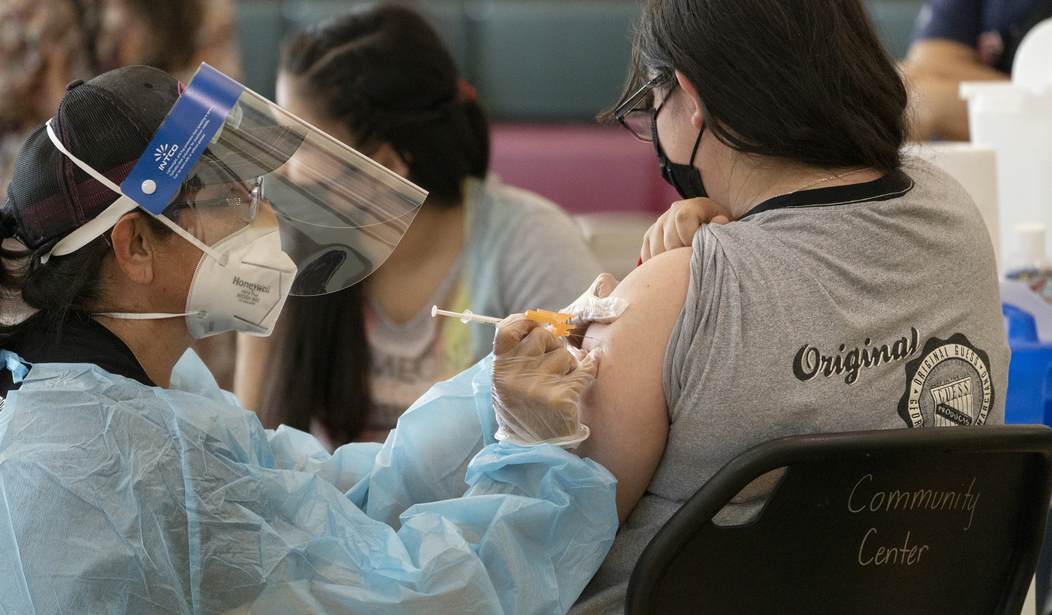The Biden administration’s threat of a vaccine mandate – which happened two weeks ago now – was likely a shock to many of the 100 million American workers who will be immediately impacted, but the waiting, while the Occupational Safety and Health Administration (OSHA) develops the requisite rules, is, as they say, the hardest part.
While employees in the private and government sectors anxiously await word on exactly how they might be punished if they are hesitant to have vaccines with dubious effectiveness injected into their bodies, state legislators, small business advocates, health care workers, unions, and even Black Lives Matter, have begun to push back.
In short: there are already lawsuits galore with more waiting in the wings the minute OSHA hands down its rules. OSHA, it appears, is aware of the legal landscape and is crafting rules that are meant to withstand challenges like the one Job Creators Network, a small business advocacy group, told Townhall they will file the minute the rules are released.
Elaine Parker, President of the Job Creators Network Foundation (JCNF), said in a statement last week the organization has created the JCNF Legal Action Fund to “defend small businesses from attacks that hurt their ability to succeed…President Biden’s small business vaccine mandate is a great example of where the JCNF Legal Action Fund can make a meaningful difference in successfully defending small businesses.”
Parker told Townhall the Biden administration has crafted disingenuous messaging surrounding the vaccine mandate meant to appeal to average Americans by making it sound like larger businesses will be the ones primarily affected.
Recommended
“But the reality is this is about businesses with 100 or more employees and remember: The Small Business Administration defines a small business as one that has under 500 employees,” Parker said. “Can the federal government force businesses to carry out a national vaccine mandate for them? The burden (of answering that question) is going to fall on small businesses.”
Parker’s group is hardly alone in their intention to fight the mandate in court. So far, 24 states are threatening legal action, while other lawsuits have come from students at universities, state trooper unions, firefighters, teachers, and health care workers, among others. The last in that list has some legal scholars noticing the judge’s decision in a New York case, in which plaintiffs are arguing for a religious exemption, has some merit.
Governments must abide by the U.S. Constitution’s safeguards for the free exercise of religion, something that doesn’t apply to companies in the private sector, legal observers said. The U.S. Supreme Court raised the bar on those protections with rulings on pandemic restrictions on crowd levels in houses of worship.
Depending on how it’s written, the OSHA rule also could draw allegations from workers—or closely held corporations with religious ownership—that it violates the Religious Freedom Restoration Act, said Nathan Chapman, a law professor at the University of Georgia who focuses on religion. That law allowed a company to deny its workers the Affordable Care Act’s health coverage for contraception based on the religious objections of the employer’s owners, the Supreme Court said in its 2014 decision in Burwell v. Hobby Lobby.
Meanwhile OSHA watches and waits, recognizing whatever final rules they write must address the potential legal challenges now being floated. One potential limiting principle is that OSHA must start with the idea that COVID-19 presents a “grave danger” in the workplace.
OSHA has been working quietly behind the scenes on an emergency temporary standard that can stand up to legal challenges. Their strongest position will be establishing the need for a mandate to protect employees against the "grave danger" of COVID-19.
"OSHA is very aware this is something that's being looked at with tremendous scrutiny," said Helen Rella, an employment attorney with Wilk Auslander. The more clearly the agency is able to articulate the dangers of COVID and provide detailed steps to mitigate it, the stronger its position against constitutional challenges.
"They are going to anticipate ... challenges and they want to head that off at the pass," Rella said, predicting the final emergency temporary standard will be very detailed.
Those fighting the OSHA rules may also come armed with growing evidence that the current vaccines may reduce transmission but do not prevent infection, dramatically reducing the potential efficacy of mandates.
Either way, Parker says her group is focused on what they see as a war on small business rather than a war on the virus.
“[The Biden administration] can't control [small businesses]; they can't corral them; they can't bully them,” Parker says. “We are rallying small business owners once again to push back on all these terrible policies that are coming after them.”

























Join the conversation as a VIP Member